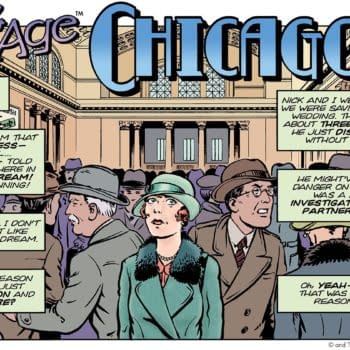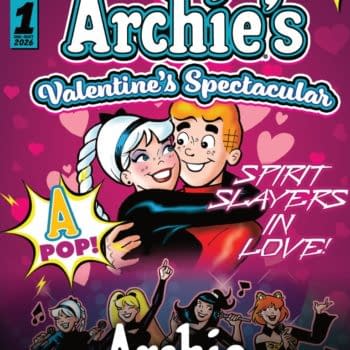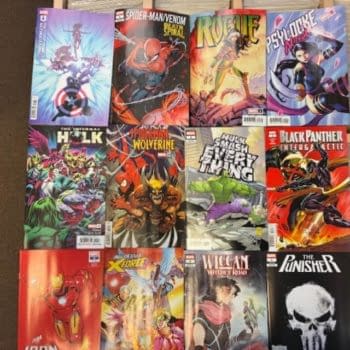Posted in: Comics | Tagged: cosplay comic con, denise dorman, entertainment
The Joy Of Cosplay, The Perils Of Commerce And The Challenge Of Comic Cons

Comics editor Tea Fougner, writes for Bleeding Cool in response to Denise Dorman's article on the current challenges for those exhibiting at comic conventions.
Once upon a time, I didn't get convention cosplay. As an industry professional, I felt like it was missing the point: why spend hundreds, or even thousands of dollars to walk around in uncomfortable shoes and sweaty makeup, just so strangers can take your photo? I found it distracting, and got irritated by people clogging up aisles to pose for photos. Cosplayers rarely had shopping bags, and didn't seem to contribute to the convention economy. I thought these people were just looking for attention, hoping to get a snapshot in the local newspaper, and I didn't understand the appeal.
Something happened in 2010 to change all that.

As a submissions editor, I frequently find myself at the mercy of creators whose sense of timing is incredibly inappropriate– anyone who has ever been in my shoes knows what it's like to have someone grab you on the way to the toilet because they have to pitch their cartoon right now, or come stop me when I am a captive audience stuck behind a table. As a woman attending fan conventions, a news reporter once asked to interview me, and then almost instantly decided to can the interview, that I "knew too much about comics for a girl." Well, yes. Knowing something about comics is my job.
One day, when I was exhibiting for work, I put on a pink wig on a whim. People stopped asking me to look at their art and started asking me what character I was supposed to be. They wanted to know about me, what I was interested in, what brought me to the convention. They no longer cared about my professional status; they cared about my interest in attending the convention.

The next day, I donned a costume, and I never looked back. This is going to be my fifth NYCC in costume, and each year convinces me more that cosplay makes conventions better.
Cosplay is primarily— not exclusively, but primarily— a hobby of the young. The vast majority of cosplayers I know are in their 20s.
As a sometime-exhibitor myself, I know how expensive it is to table at a convention. But for a lot of very young people, simply attending is also pricey. In an economic environment that glorifies the unpaid internship and where recent college grads often work for minimum wage, a comic convention weekend badge can cost a full day's pay. And for young parents, add in the cost of gas, lodging, and food to badges for a family of four, and there may not be much money left to spend on merchandise. Young people often cosplay to show their appreciation in a way that doesn't require a lot of money. The news often focuses on the most outrageous costumes we see, but anyone with a pair of slacks, buttondown shirt, and a trenchcoat can transform themselves into Castiel from Supernatural, and a young woman with a black leotard and a pair of fishnets can dress like Black Canary.

For many new creators, the first time a congoer shows up dressed as one of their characters is a banner moment to be cherished— even if that cosplayer can't afford to buy art, or doesn't yet have a home where they can display art. As homeownership crumbles with the rapidly diminishing salaries of emerging young adults, many young people don't have a place to store art or books, and depend on digital comics for most of their comics reading– which can't usually be purchased or signed at a convention. A costume can be stored in a dresser, closet, or even a duffel bag for the most transient of us. It doesn't need to be handled with care or stored in a climate-controlled environment.
There are tons of young people who are going to conventions and taking advantage of the panel viewings, or simply walking the floor to look longingly at the art they one day hope to afford, regardless of whether they are in costumes or not. The fact that they are spending all of their spare cash simply to attend the convention and be in the same place as all that amazing creative energy is a testament to their love of the art form, even if they don't yet have the money to contribute to individual creators. Of course, many of us do have money, and many of us ARE spending it on works by creators. At my most recent con, I walked the floor with a fellow cosplayer in her mid-twenties, who made small purchases from six different creators. My friend was eager and excited to show her cosplay to her favorite creator, who was absolutely overjoyed to see her costume. It also gave my friend, who is normally shy around people she admires, something to talk to her favorite creator about.

Many of the more traditional reasons to attend conventions are falling to the wayside. Rare books, toys, and other paraphernalia are now available online. Shipping is cheaper than a con badge. I've bought an entire out-of-print run of a favorite comic from the early 90s with a few taps on my phone screen. I don't paw through back issues at conventions anymore. People can chat with their favorite creators on Tumblr or Twitter every day, and have a much richer interaction with them, spanning the course of years, than they might have in a short exchange in a rushed line for a signed book. But people who might have given a con a pass when they discovered they could get their favorite book more cheaply from Amazon may still be enticed to come so that they can see the amazing costumes that cosplayers work on for weeks, months, and even years. Every single one of those people coming to see cosplayers might turn around and make an impulse purchase.
Many comic publishers have been taking strides over the past few years to become more inclusive in the titles they put out. Conventions are also becoming more woman-friendly and LGBT-friendly over the past decade. Most cosplayers are female, and a relatively high percentage of cosplayers identify as LGBT. They don't always read the same comics or look at the same art that the main demographic of cons of yesteryear appreciate, but young creators who publish coming-of age stories about teenaged lesbians and menstrual cramps don't jump to the conclusion that classic comics fans are not spending money at cons simply because their comics are not selling to that group. Cosplayers, like anyone else, comission sketches from the artists whose work speaks to them, and those may not always be classic science fiction, fantasy, or superhero artists. Then again, the cosplayer friend I mentioned a few paragraphs above came armed with a list of longtime DC Comics luminaries she wanted to meet and buy from.
If cosplayers aren't buying within a genre, similar fans who don't cosplay are probably not buying that work, either– the addition of wings and horns is not what's preventing a transaction. For creators who feel their convention sales are lagging, the question should not be "Why are these people outside my target demographic not buying my work?" but "Why are *my* fans not finding me to spend money at these shows?" If your fans aren't interested in attending conventions in certain cities, ask where you might reach them instead, or what might encourage them to attend. If they're not spending money on what you're offering, ask what would interest them. Remind your fans that their support is important should they wish to continue to see you at conventions. Having been on both sides of the table, I know that no amount of crowding in the aisles, by cosplayers or otherwise, will stop a fan who wants to come support a particular creator. There are tons of great ways to engage fans online, to make sure they know what events you're at, and where your table is. Many creators have done an amazing job of promoting fan enthusiasm online that translates into lines at their booths– lines that often include cosplayers!

"But," you say, "I never see cosplayers carrying merchandise. You must be the exception to the rule." You're absolutely correct– you don't see us carrying merch in costume. For the most dedicated cosplayers, shopping on the con floor in costume is rendered prohibitive by our unwieldy props, and it ruins the illusion for other fans.
But we often choose a day, or half-day, to make our purchases. I always do my shopping on Sunday, once I've managed to look at everything. That's been my MO since my first con in 1998, long before I began wearing costumes.
Dealers and creators whom I meet in costume almost never recognize me when I come back in street clothes or a more low-key cosplay. Heck, some of my close friends don't recognize me when I walk up to their booths in a wig– I don't expect creators I've only met a few times to know who I am when they've only seen me dressed as a comic book character. (One industry pro for whom I hold a great deal of esteem joked that he can't recognize me anymore if I'm not Captain America.) So before declaring that cosplayers don't buy, consider that your last customer of the day on Sunday may have been the guy wearing that neat, fully-functioning Iron Man costume on Friday. And some of us have traded years of supplying water and sandwiches and table assistance to be allowed to leave our merch at our friends' tables, or have sweet-talked our non-cosplaying pals into letting us put our books into their backpacks.
Since I began cosplaying, I've often paid my own way out of my own pocket to go to conventions that aren't part of my professional schedule— and I buy from vendors and creators at all of them. This is one congoer who is absolutely adding dollars to the convention ecosystem that would have gone elsewhere had it not been for cosplay. I've met and purchased from creators I might not have bothered to see if it weren't for cosplay. Finding ways to engage with cosplayers is a way to make a sale– and maybe even a new fan. I've had creators wave me down because they were selling prints of the character I was cosplaying as– and I've purchased them.

I've now cosplayed on both sides of the exhibitor's table. And I would encourage absolutely everyone— regardless of age, gender, creator status, or any other identifiers— to try cosplaying in a convention environment at least once. It's one of the purest forms of fun I can imagine— make believe for adults and kids alike. I can't express to you how amazing it feels the first time a child runs up to you, overjoyed to meet their favorite cartoon character, or a mom bursts into tears and asks to take your photo for her daughter, who was told by boys at school that a girl couldn't be Captain America. Even if you only try it once, the stories you hear and the people you meet will stay with you for a lifetime.
And I guarantee you will still buy (or not buy) the same exact merchandise you would have bought (or not bought) in your streetclothes.
Tea Fougner is a professional comics editor working for King Features, blogs at http://www.comicskingdom.com, and develops websites for cartoonists. She also cosplays a lot– at conventions, Renaissance Fairs, theme parties, sometimes even to go pick up groceries. You can find her on tumblr at http://teaberryblue.tumblr.com












